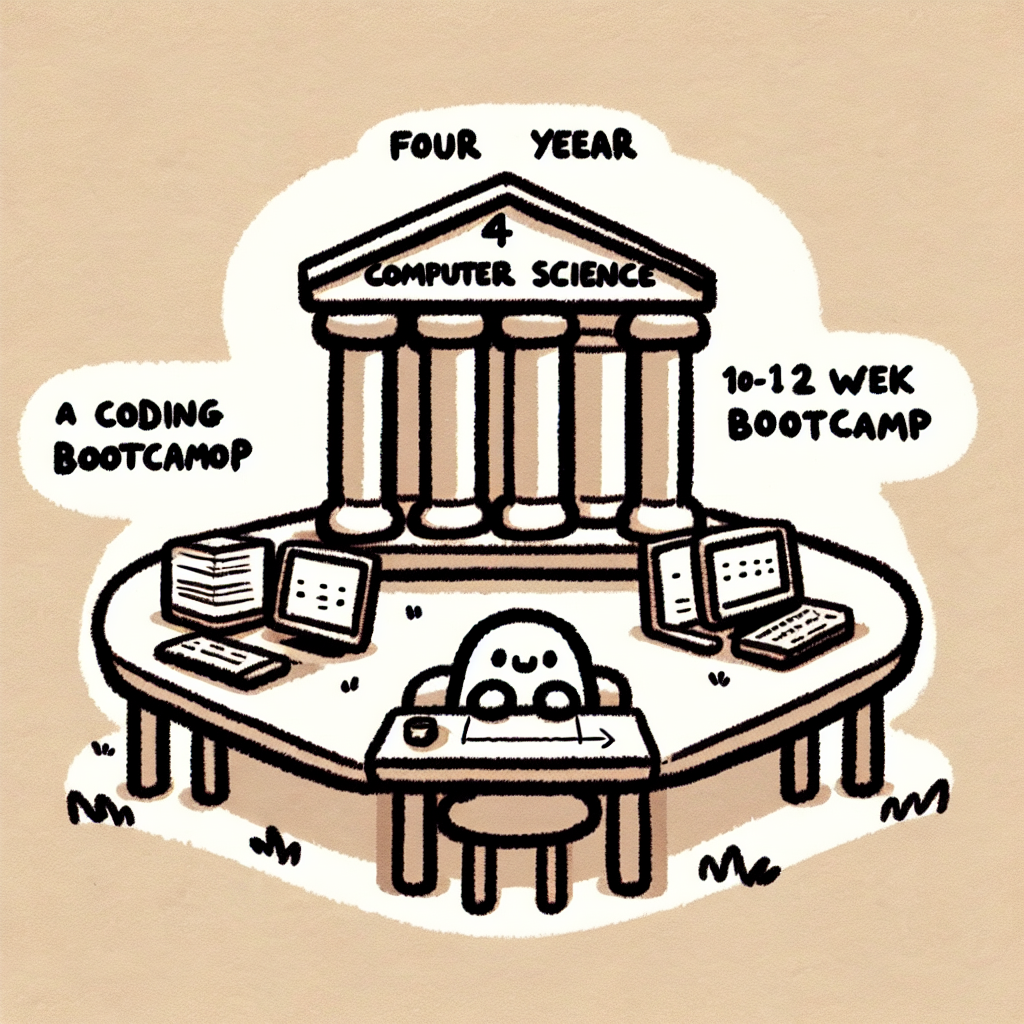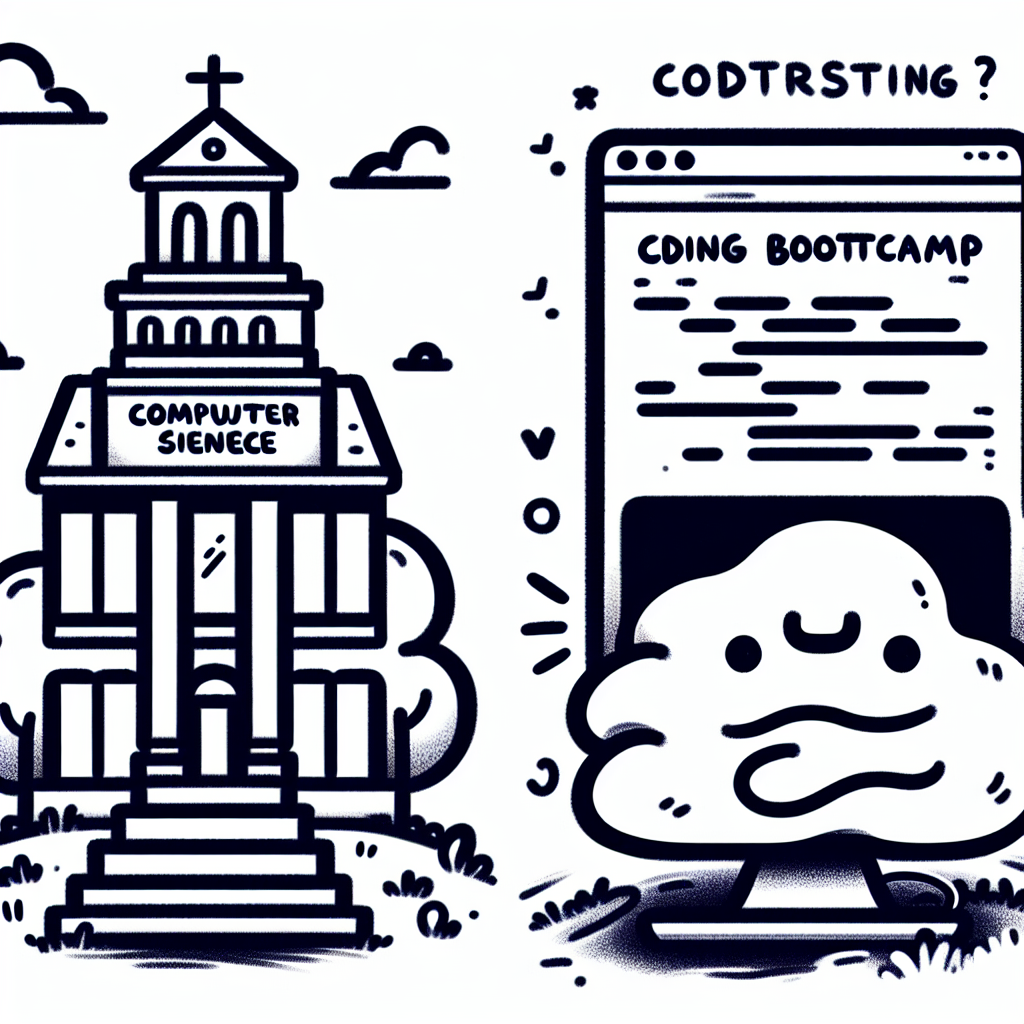Introduction
In recent years, both coding bootcamps and traditional computer science (CS) degrees have gained significant attention as pathways into the tech industry. Coding bootcamps offer accelerated, practical training programs designed to equip students with job-ready programming skills in a matter of months. In contrast, CS degrees provide a comprehensive, theory-based education over the course of several years through accredited colleges and universities.
As more people consider careers in technology, the debate of computer science bootcamp vs degree becomes increasingly relevant. Each path offers unique advantages and drawbacks, making it essential for aspiring tech professionals to understand the differences before making a decision.
This article aims to provide a clear comparison of computer science bootcamp vs degree by examining key factors such as cost, curriculum, job outcomes, and long-term career growth. By evaluating these elements, readers can make informed choices based on their personal goals, financial situations, and learning preferences.

Program Structure and Learning Experience
When comparing a computer science bootcamp vs degree, the structure and learning experience of each path differ significantly.
🏫 Traditional Computer Science Degree
A traditional computer science degree typically spans four years and offers a structured, semester-based curriculum. Students delve into core CS fundamentals such as algorithms, data structures, operating systems, database systems, and the theory of computation. Degree programs also provide elective options in specialized areas like artificial intelligence, cybersecurity, and software engineering. The emphasis is often on theoretical and mathematical foundations, providing students with a broad and deep understanding of computer science principles. Learning takes place on-campus, with access to labs, academic networks, and other institutional resources.
🖥️ Coding Bootcamp
In contrast, coding bootcamps are designed to deliver practical, job-ready skills in a condensed timeframe, typically lasting 10–12 weeks but sometimes extending up to six months. The curriculum focuses on hands-on experience with technologies such as Git, React, Node.js, and full-stack web or mobile development. Bootcamps are fast-paced and immersive, often conducted online or in hybrid formats, allowing for flexible scheduling. The learning model is project-based, simulating real-world coding challenges to prepare students for immediate employment.
📌 Citation
Bootcamps emphasize job-ready skills, whereas degrees offer comprehensive, theoretical training.

Cost and Time Investment
💰 Bootcamp
Computer science bootcamps typically cost around $13,584 on average (Citation). These programs are designed to be completed quickly, often within 10 to 12 weeks. Because of their short duration, the opportunity cost is lower—students spend less time out of the workforce and can transition more rapidly into tech roles.
🎓 Degree
In contrast, obtaining a computer science degree usually requires a much larger financial and time investment. Tuition costs vary significantly, ranging from $25,000 to over $100,000 depending on factors like the institution and whether the student is in-state or out-of-state. The typical time to completion is four years. Additional expenses such as housing, textbooks, and other fees can further increase the total cost. Students may also face long-term debt as a result of financing their education.
⚖️ Summary
When comparing a computer science bootcamp vs degree, bootcamps are generally faster and more affordable. However, degrees demand a greater commitment in both time and money, which may translate into broader long-term benefits depending on individual career goals.

Employment Outcomes
📈 Employment Rates
When comparing employment rates, the difference between computer science bootcamp vs degree holders is relatively small. According to recent data, 66.9% of bootcamp graduates secure employment (Citation), while 68.06% of those with a computer science degree find jobs. This suggests that both paths can lead to comparable employment outcomes, although the contexts may differ.
💼 Job Readiness
Bootcamps are structured to deliver high job placement outcomes. They often include career coaching, resume workshops, and hiring events designed to connect students directly with employers. In contrast, those earning a computer science degree may need to proactively pursue internships and build professional networks to improve job prospects after graduation. The difference in structure affects how quickly graduates can transition into the workforce.
🧠 Hiring Perception
Perceptions in the job market still vary when it comes to computer science bootcamp vs degree credentials. Some employers continue to prefer candidates with a traditional degree, especially for roles that demand deep theoretical knowledge. However, bootcamp graduates are increasingly accepted in startups and tech companies that prioritize practical coding skills and project experience. This shift reflects a growing recognition of alternative education paths in the tech industry.

Salary Expectations
When comparing computer science bootcamp vs degree pathways, salary expectations are a critical factor to consider. Both routes can lead to rewarding careers, but the starting salaries and long-term earning potential can differ significantly.
💵 Starting Salaries
Coding bootcamp graduates report an average starting salary of $70,698 (Citation). This figure is competitive with many entry-level roles in the tech industry. In contrast, computer science degree holders have a broader salary range, typically starting between $50,000 and $106,000 depending on the specific role and geographic region. This range reflects the diversity of job titles and industries open to degree holders.
📊 Factors Influencing Salary
Several key factors influence starting and long-term salaries in the tech field:
- Industry: Roles in finance or tech tend to offer higher salaries compared to those in education or non-profits.
- Location: Jobs in tech hubs like Silicon Valley or New York generally pay more than similar positions in mid-sized or rural areas.
- Previous Experience and Portfolio: Both bootcamp graduates and degree holders can command higher salaries if they demonstrate strong personal projects, internships, or relevant work experience.
Understanding these variables is essential when evaluating the salary outcomes of a computer science bootcamp vs degree.

Long-Term Career Growth and Flexibility
📈 Career Advancement
When comparing computer science bootcamp vs degree paths, long-term career advancement often favors degree holders. Those with a traditional CS degree typically gain easier access to specialized roles such as AI researcher or systems architect. They are also more likely to be considered for leadership and managerial positions due to their broad theoretical foundation and formal credentials.
On the other hand, bootcamp graduates may face limitations in upward mobility, particularly in roles requiring deep technical knowledge or academic credentials. Many eventually pursue additional education, such as a CS degree or professional certifications, to overcome these barriers and continue advancing in their careers.
🎓 Advanced Education
A clear advantage of earning a computer science degree is the pathway it provides to graduate-level education. Advanced degrees, such as a master’s in computer science, can significantly enhance earning potential—on average, master's degree holders earn about $30,000 more annually (Citation). Bootcamp graduates, without a foundational degree, often do not have immediate access to these academic opportunities.
🔄 Career Flexibility
Flexibility across different roles and industries is another area where degree holders tend to have the upper hand. A traditional computer science degree covers a wide array of topics, from algorithms to operating systems, enabling graduates to move between various technical and theoretical roles. In contrast, bootcamps are typically focused on specific development skills, which can limit flexibility in the long run. While effective for quick job placement in software development, bootcamp training may not support broader career pivots without further education.

Learning Styles and Personal Fit
When comparing a computer science bootcamp vs degree, it's important to consider individual learning styles and personal goals. Each path caters to different types of learners and career trajectories.
🤔 Who Should Choose a Bootcamp?
Computer science bootcamps are typically best suited for:
- Career changers who want a fast-track into the tech industry without spending years in school.
- Individuals who already have degrees in other fields or relevant experience in adjacent areas like design, math, or engineering.
- Self-motivated learners who thrive in fast-paced, hands-on environments and can commit to intensive training over a few months.
Bootcamps emphasize practical skills, real-world projects, and job readiness, making them ideal for those who learn best through doing rather than theory.
🎓 Who Should Choose a Degree?
A traditional computer science degree may be a better fit for:
- High school graduates aiming to build a long-term career in tech with a strong academic foundation.
- Those drawn to the theoretical and research aspects of computer science, such as algorithms, data structures, and computational theory.
- Students who want to keep their options open for advanced degrees, teaching roles, or positions in academia and research.
University programs often offer broader exposure to math, science, and humanities, supporting a well-rounded education that can open doors beyond software development.
Choosing between a computer science bootcamp vs degree depends heavily on how you learn best and your long-term career objectives.

Industry Trends and Future Outlook
🌍 Tech Industry Acceptance
The tech industry has increasingly embraced non-traditional education paths, creating more opportunities for bootcamp graduates. Major companies such as Google, IBM, and Apple have publicly stated that they no longer require a four-year degree for many roles, instead focusing on demonstrable skills and practical experience. Alternative credentialing programs like Google Career Certificates are also gaining traction, signaling a broader shift in hiring philosophies across the sector.
📈 Bootcamp Evolution
Bootcamps have evolved significantly in recent years, moving beyond general software development to offer specialized tracks in areas like data science, cybersecurity, and artificial intelligence. Some bootcamps have pursued accreditation or established partnerships with universities to enhance credibility. These developments make bootcamps a more competitive option in the "computer science bootcamp vs degree" debate, especially for learners targeting specific tech domains.
🏛️ Role of Traditional Degrees
Despite the rise of bootcamps, traditional computer science degrees continue to hold significant weight in academia, research and development, and government sectors. These degrees often provide a strong theoretical foundation necessary for cutting-edge fields such as quantum computing and machine learning. For roles that require deep technical knowledge or structured academic training, a traditional degree may still be the preferred—or even required—credential.

Combining Both Paths
🔀 Hybrid Approaches
When comparing a computer science bootcamp vs degree, it's important to recognize that these two paths are not mutually exclusive. In fact, many professionals choose to combine both to maximize their skills and career opportunities.
Some students pursue a traditional computer science degree to build a strong theoretical foundation, then attend a bootcamp to gain practical, hands-on experience with specific tools and technologies. This hybrid approach lets them apply academic knowledge in real-world scenarios, often accelerating their entry into the job market.
Conversely, individuals who already hold a degree—whether in computer science or another field—may enroll in a bootcamp to pivot into tech or update their skills. Bootcamps focusing on current frameworks, libraries, and development practices offer a fast-track way to stay relevant in a rapidly evolving industry.
📚 Lifelong Learning in Tech
Regardless of whether someone starts with a computer science bootcamp or degree, continuous learning is essential in the tech field. The industry evolves quickly, and professionals must adapt to new languages, tools, and methodologies.
Certifications, MOOCs (Massive Open Online Courses), and nanodegrees serve as valuable resources for ongoing education. These options allow individuals to specialize, deepen their expertise, or explore new career paths. They are also accessible and flexible, making them suitable for professionals at any stage of their careers.
In the debate of computer science bootcamp vs degree, success often hinges on a commitment to lifelong learning and the strategic combination of education paths.

Conclusion
When considering a career in technology, the choice between a computer science bootcamp vs degree comes down to individual circumstances. Both paths offer legitimate ways to enter the tech industry.
Computer science bootcamps are designed to be fast-paced and cost-effective. They focus on practical, job-ready skills that can help learners transition into tech roles quickly. This makes them an appealing option for career changers or those looking to minimize time and financial investment.
On the other hand, a traditional computer science degree offers a comprehensive understanding of computing theory, algorithms, and systems. It provides greater academic depth, a broader skill set, and more flexibility for long-term growth, which can be advantageous for roles in research, academia, or advanced software development.
Ultimately, choosing between a computer science bootcamp vs degree depends on an individual’s goals, learning preferences, financial situation, and career objectives. Each path has its merits, and the right one varies from person to person.

References
- Online CS - Coding Bootcamps vs. Degree
- BYU Universe - What is More Employable?
- WGU - IT Degree vs. Bootcamp
- Caltech - Bootcamps vs. Traditional Degrees
- Northeastern - Is a Coding Bootcamp Worth It?







.png)






